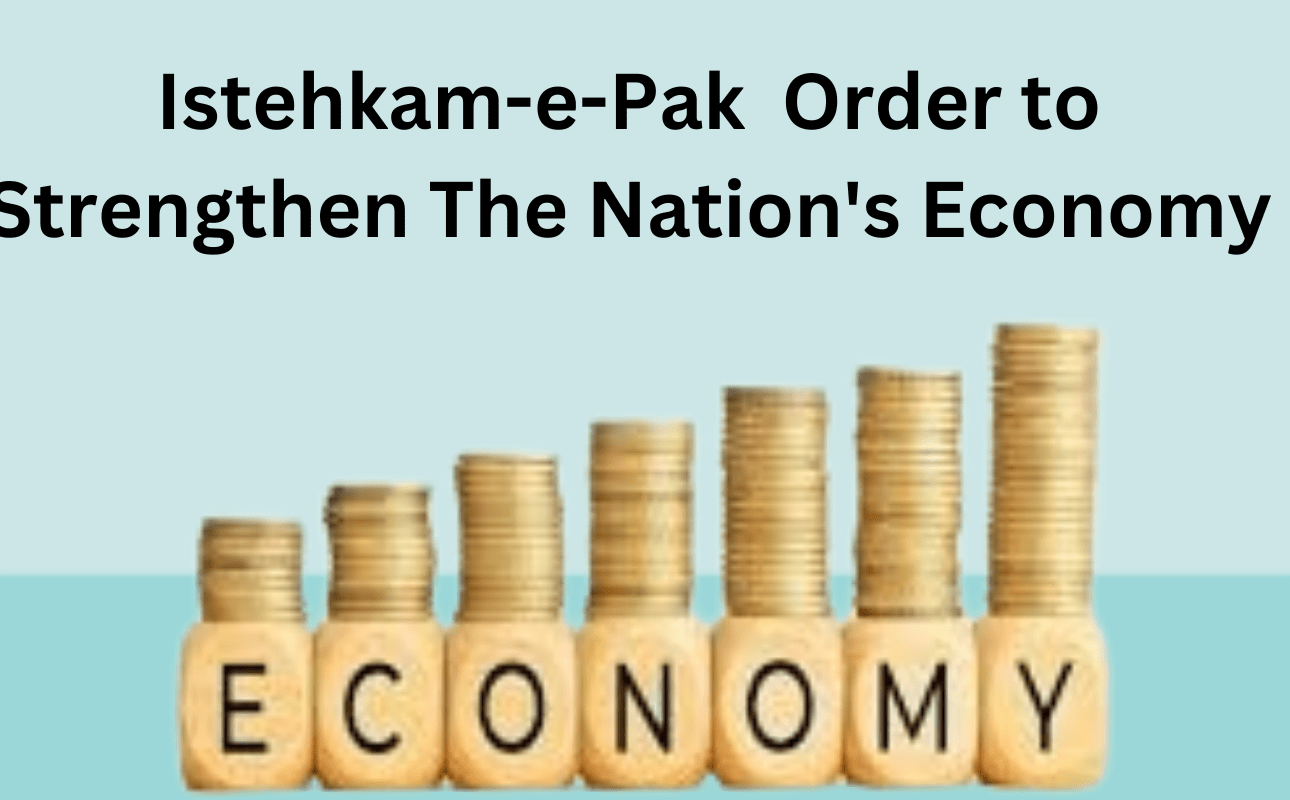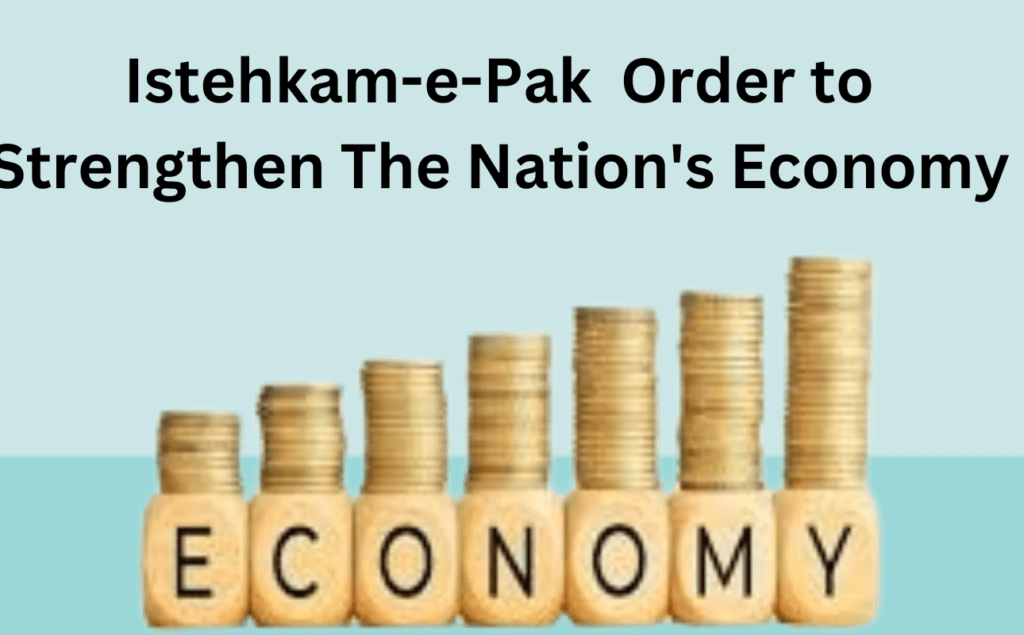Istehkam-e-pk order to strengthen the nation’s economy, Pakistan Party Chairman Jahangir Tareen has announced collaborating with President Shehbaz Sharif and the Pakistan Muslim League’s Nawaz Quaid Nawaz Sharif.

Introduction to Istehkam-e-Pak Order
In the wake of economic challenges, the Istehkam-e-Pak Order emerges as a beacon of hope for bolstering the nation’s economy. This initiative, rooted in the ethos of fortification and progress, aims to address systemic issues and propel sustainable growth. At its core, the Istehkam-e-Pak Order signifies a comprehensive strategy devised to invigorate various sectors and ensure a robust economic framework for future generations.
Historical Context
The backdrop against which the Istehkam-e-Pak Order unfolds is laden with economic hurdles and endeavors of the past. From fluctuations in global markets to internal constraints, the journey towards economic stability has been riddled with challenges. Previous efforts, though valiant, often fell short in achieving enduring prosperity. However, each setback served as a catalyst for innovation and resilience, laying the groundwork for the comprehensive approach embodied by the Istehkam-e-Pak Order.
Objectives of Istehkam-e-Pak Order
Central to the Istehkam-e-Pak Order are clear and attainable objectives aimed at reshaping the economic landscape. Through targeted interventions and strategic investments, the Order seeks to:
- Boost GDP growth and productivity
- Enhance export competitiveness
- Create employment opportunities
- Reduce poverty and income inequality
Strategies and Initiatives
The implementation of the Istehkam-e-Pak Order entails a multi-faceted approach, encompassing policy reforms, infrastructure development, and capacity building. Key initiatives include:
- Streamlining regulatory processes to foster a business-friendly environment
- Investing in critical infrastructure projects to catalyze growth in key sectors
- Facilitating access to finance and credit for small and medium enterprises
- Promoting innovation and entrepreneurship through incentives and support programs
Role of Government and Private Sector
Collaboration between the government and the private sector is paramount to the success of the Istehkam-e-Pak Order. While the government provides policy direction and regulatory support, the private sector plays a pivotal role in driving investment and innovation. Incentives such as tax breaks, subsidies, and public-private partnerships are leveraged to encourage private sector participation and stimulate economic activity.
Impact on Different Sectors
The Istehkam-e-Pak Order is poised to have a trans formative impact across various sectors of the economy. From agriculture to manufacturing, and from services to technology, every facet of the economy stands to benefit from targeted interventions and strategic investments. The creation of employment opportunities, improvement in productivity, and expansion of export markets are among the many positive outcomes anticipated.

Challenges and Solutions
While the Istehkam-e-Pak Order holds promise for economic revitalization, it is not without its challenges. Structural inefficiencies, bureaucratic red tape, and external shocks pose significant hurdles to progress. However, proactive measures such as institutional reforms, capacity building, and risk mitigation strategies are being implemented to address these challenges and ensure the smooth execution of the Order.
Public Awareness and Participation
Public awareness and participation are integral to the success of the Istehkam-e-Pak Order. Educational campaigns, community engagement initiatives, and transparent communication channels serve to mobilize support and foster a sense of ownership among the populace. By actively involving citizens in the economic development process, the Order aims to harness the collective wisdom and energy of the nation towards a common goal.
Future Prospects and Sustainability
Looking ahead, the Istehkam-e-Pak Order holds the promise of a brighter future for the nation’s economy. By laying the groundwork for sustainable growth and development, the Order aims to ensure prosperity for future generations. Embracing principles of environmental sustainability, social inclusion, and equitable distribution of resources, the Order seeks to build a resilient economy that can withstand the challenges of the 21st century.
Global Implications
The success of the Istehkam-e-Pak Order has far-reaching implications for the global economy. By positioning the nation as a competitive player in the international arena, the Order opens up new avenues for trade, investment, and collaboration. Strengthened diplomatic relations and enhanced regional integration further augment the nation’s standing on the global stage, paving the way for mutually beneficial partnerships and alliances.
Success Stories and Case Studies
Amidst the challenges and complexities, there exist shining examples of economic success stories that inspire and guide the journey ahead. From countries that have undergone remarkable transformations to businesses that have defied the odds, these case studies offer valuable insights and lessons learned. By studying and emulating these success stories, the Istehkam-e-Pak Order aims to chart a course towards sustainable prosperity.
Monitoring and Evaluation
Central to the implementation of the Istehkam-e-Pak Order is a robust system of monitoring and evaluation. By regularly tracking progress against key performance indicators and benchmarks, policymakers can assess the effectiveness of interventions and make informed decisions. Continuous feedback loops enable course corrections and adjustments, ensuring that the Order remains responsive to evolving challenges and opportunities.
The politician-turned-businessman charged that the previous administration had neglected NA-149 Multan, turning it into a hot spot of issues. He promised to address all issues, including slums roads, and sewage.
“There will be more employment opportunities if the economy is managed well,” Tareen declared on Friday,talking to the Union Council VIII employees.
Income will rise if the “economy shines,” according to the IPP chairman.Declaring economic growth in the nation”the most important,” Tareen promised to create jobs and to carry out actions that would satisfy the general public.
The IPP chairman claimed that the manifesto would address every issue. “I will address all of the constituency’s issues, no matter how minor. I’ll live up to everyone’s expectations.“Multan’s problems are many, but they’re all mine now,” he remarked. Since this nation has given us everything, it is our duty to make it more beautiful.
On February 8, the day of the election, he hoped that they would receive good news. Former Union Council chairman Rana Mairaj Khalid declared his intention to join the IPP after expressing confidence in Tareen’s leadership.
Tareen had a warm welcome and was showered with flowers when he arrived at several locations. Tareen had earlier met at the office of prominent businessman Chaudhry Zulfiqar Ali Anjum to discuss a number of topics.The chairman of the IPP went to Hazrat Shah Shams’ shrine and said prayers.
It was prayed by Sajjada Nasheen Makhdoom Syed Naveed Shamsi. Meeting Pir Syed Asad Abbas, Tareen expressed his sorrow at his son’s passing. Pir Asad and his brother Naveed Shah announced their unwavering support for Tareen at the event.Tareen met district PML-N President Bilal Butt at his home in the meantime.
There were also former union council chairs in attendance. Rafiq Sandila, the former chairman of the PTI, joined the PML-N and declared his complete support for the joint candidate of the IPP and PML-N. The key to the party’s vision, according to the Istehkam-e-Pakistan Party (IPP) manifesto, is the empowerment of the people. According to the party’s manifesto, Imran Khan, the founder of the PTI, first advocated for the idea of a “Naya Pakistan,” which the leadership is committed to establishing.
By promoting youth empowerment and raising the middle class and lower classes, the party seeks to reduce poverty in Pakistan. The IPP also ranks healthcare and women’s empowerment as high
priorities. The manifesto also highlights how important it is to protect minority rights, promote regional travel and sports, and safeguard the property and rights of Pakistanis residing outside.
Few of the more than 150 registered parties contesting the elections have released manifestos. Only a small number of the over 150 registered political parties running in the election have published
comprehensive manifestos. It is unclear how much weight Pakistani political parties give to their manifestos given their lack of enthusiasm in making them public.
It suggests that some political figures see manifestos as merely ceremonial documents rather than as potent instruments capable of winning elections and influencing voters in their favor. But it’s important to understand the importance of a well-written manifesto. A party’s vision, programs, and suggested course of action should it win elections are all outlined in detail in its manifesto. Voters can use it to understand a party’s position on important topics and to hold them responsible for keeping their commitments.
- What is the Istehkam-e-Pak Order?The Istehkam-e-Pak Order is a comprehensive initiative aimed at strengthening the nation’s economy through targeted interventions and strategic investments.
- How does the Istehkam-e-Pak Order differ from previous economic policies?Unlike previous policies, the Istehkam-e-Pak Order adopts a holistic approach that addresses systemic issues and focuses on sustainable growth and development.
- What sectors will benefit from the Istehkam-e-Pak Order?The Istehkam-e-Pak Order aims to benefit various sectors of the economy, including agriculture, manufacturing, services, and technology, through targeted initiatives and investments.
- What role do the government and private sector play in the Istehkam-e-Pak Order?The government provides policy direction and regulatory support, while the private sector drives investment and innovation, fostering collaboration for economic progress.
- How can individuals contribute to the success of the Istehkam-e-Pak Order?Individuals can contribute to the success of the Istehkam-e-Pak Order by supporting government initiatives, participating in economic activities, and promoting awareness of the Order’s objectives and benefits.


